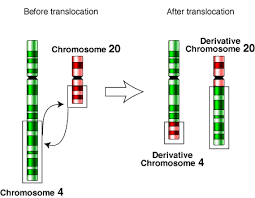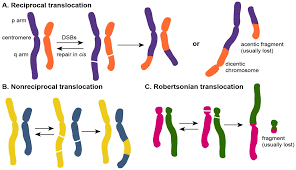A translocation is a chromosomal mutation in which there is a change in position of chromosome segments and the gene sequences they contain. There is no gain or loss of genetic material involved in a translocation.
Types of Translocation
Two simple kinds of translocations occur. One kind involves a change in position of a chromosome segment within the same chromosome: this is called an intrachromosomal(within a chromosome) translocation.
The other kind involves the transfer of a chromosome segment from one chromosome into a nonhomologous chromosome; this is called an interchromosomal translocation (between chromosomes.
If this latter translocation involves the transfer of a segment in one direction form one chromosome to another, it is a nonreciprocal translocation; if it involves the exchange of segments between the two chromosomes it is a reciprocal translocation.
Consequence of Translocation

In organisms homozygous for the translocations, the genetic consequence is an alteration in the linkage relationships of genes. For example, in the nonreciprocal intrachromosomal translocation, the BC segment has moved to the other chromosome arm and has become inserted between the F and G segments.
As a result, genes in the F and G segments are now farther apart than they are in the normal strain, and genes in the A and D segments are now more closely linked. Similarly, in reciprocal translocations new linkage relationships are produced.
Read Also : How to Plant Fruit Trees for Optimum Performance
Synapsis in Translocation Heterozygote

In conclusion, reciprocal translocations are diagnosed genetically by semisteriity and by the apparent linkage of genes known to be on separate chromosome.
Translocation is when a part of a chromosome joins part of another chromosome. Translocation heterozygotes are usually identified cytologically because they form characteristic cross-like shape during synapsis in meiosis. Translocation affect fertility of organisms carrying them.
Read Also : How to Generate Money from Agricultural Wastes
Frequently Asked Questions
We will update this section soon.

